七年级英语下册 Unit 10 It’s a nice day,isn’t it学案 鲁教版
新目标八年级英语下册Unit 10 It's a nice day, isn't it SectionB课件

Talking
A: It’s very crowded, isn’t it? B: Yes, it is. The “New Kids” are really popular. A: This line is moving slowly, isn’t it? B: Yes, it is. I’ve been waiting for 15 minutes. A: The tickets are expensive, aren’t they? B: Yes, they are. $20 is a lot of money! A: It’s cold today, isn’t it? B: Yes, it is. I don’t like this weather.
Conversation 1 Conversation 2 Conversation 3 at a party at school
at a ball game
Questions 1. You’re Jenny’s friend, aren’t you?___ d 2. So, tell me about yourself. Do you play any f sports?___ c new here, aren’t 3.You’re you?____ byou think of 4.What do this school?___ a really crowded, 5. It’s isn’t it?__ 6. Did you see thee game on TV Friday night?___
e
Answers a. Yes, it is. Are you a ball game fan? b. It’a great. Have you always gone to this school? c. Yes, I am. My name is Bill. d. Yes, I am. My name is Rital. e. Yes, I did. It was really exciting, wasn’t it? f. Yeah! I play tennis and ping-pong.
unit 10 It is a good day, isn’t it
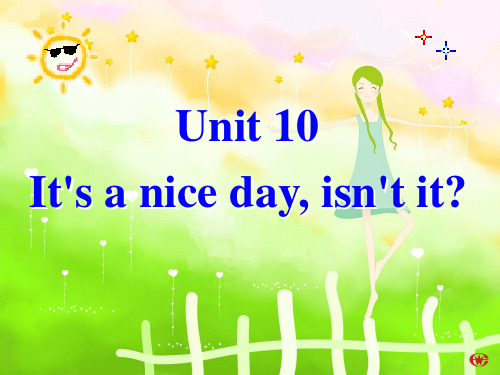
9) You'd like to go with me, ___________? wouldn't you isn't he 10) He must be a doctor,__________? aren’t they 11) What colours,__________? are we 12) Neither you nor I am engineer,__________?
1. You will go to America, _________? won’t you
2. We have ever been to Shanghai,
__________ ? haven’t we
3.He can speak English,
can’t he?
3. 特殊用法 (1) 1. His mother is a doctor, ________ ? isn’t she 2. The dogs are fighting, __________? aren’t they 3. There is a boy in our classroom, _________? isn’t there 4. There were many cars in the street, ____________? weren’t there 5. There will be robots in our families, __________? won’t there
13 )
Everything is ready, isn't it?
14)
Everyone knows the answer, don't they?
13) 陈述部分主语是指示代词或不定代词everything, that, nothing, this, 疑问部分主语用it。 Everything is ready, isn't it? 主句谓语是think, believe, expect, suppose, imagine等引导 的宾语从句(尤其当主句主语是第一人称时),疑问部分与宾语从句 相对应构成反意疑问句。 I don't think he is bright, is he? We believe she can do it better, can't she? 15) 陈述部分主语是不定代词everybody, anyone, somebody, nobody, no one 等,疑问部分常用复数they,有时也用单数he。 Everyone knows the answer, don't they? (does he?) Nobody knows about it, do they? (does he?)
Unit;10;It’s;a;nice;day;,;isn’t;it;-复习课学案

Unit;10;It’s;a;nice;day;,;isn’t;it;?复习课学案unit 10 it’s a nice day , isn’t it ?复习课学案复习目标:1.words and useful expressions in this unit .2. make small talk .重难点:tag questions .一. 课前预习:read through this unit and finish these exercises :task 1. words and phrases in this unit :1在中午___________2 向某人道别_____________________3 阅读_____________4 乘电梯______________5 〔意外地〕出现_____________6 相处______________7 至少_____________8至多______________9过公路_____________________10 书店_____________ 11 迷________ 12 交通_________ 13 low (反)__________14 sand (adj.)__________ 15 least (反)____________ task 2 完成句子:1 ---he’s ________ _________(真的很好) , isn’t he ?--- he ________ ________(确实很好)!2 看上去要下雨了。
it _______ ________ rain .3 周末总是下雨,对吗?it always rains ________ ________ _______, ________ _________?4 但对我来说有点热。
but it’s _____ _______________ _______ ________ .5 it’s never crowded , _______ _________(反义疑问句)?6 作为学校里的一名新生有时不简单。
英语:Unit_10_It’s_a_nice_day__isn’t_it课件(人教新目标八年级下) (2)
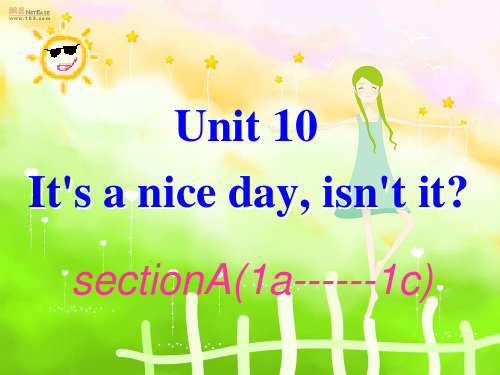
they did Yes, ___ ____. Eric worked really hard that day.
There aren’t many books in the are there library, ___ _____ ?
Yes, there are.
Beckham can’t play the guitar, ___ can __? he
you can talk to? Make a list of these places.
in a station
in a bank
at a party
How do you start a conversation with a stranger? How do you do? How are you?
Not personal enough!
We can start like this:
It’s a nice day, isn’t it? Yes, it is.
She’s a beautiful girl, isn’t she? Yes, she is.
He can speak English, can’t he?
• 简单问句有两部分构成:
• 将前句变为问句的词 前句的主语。必用代词 ?
③ 陈述句中含有 never, few, little, hardly,
nothing, nobody, seldom等具有否定意义 的词,其后面疑问部分用肯定形式。
There is nobody in the room, is there? You have never been to Shanghai, have you? Robin only did little homework, did he?
Unit;10;It’s;a;nice;day,;isn’t;it-

Unit;10;It’s;a;nice;day,;isn’t;it?unit 10 it’s a nice day, isn’t it?一. 教学内容:unit 10 it’s a nice day, isn’t it?二. 教学过程:1. 重点短语:tell sb. about sth. 告知某人某事,hate doing sth. 厌烦做某事help sb. with sth. 协助某人〔做〕某事,think of 想起hundreds of 数百,成百上千,in the future 在将来come true 实现,be careful 当心,留神;at least 至少get along 相处融洽,look through 阅读,be able to 能够,会space station 太空站,go skating 去滑冰2. 交际用语:〔1〕it’s a nice day, isn’t it?〔2〕what a nice day, isn’t it?〔3〕it looks like rain, doesn’t it?〔4〕i hope so /not.〔5〕so do i.3. 语法:学习反意疑问句。
三. 重、难点讲解:1. do you think it’ll stop by noon?此句中的by noon 意为“在中午之前”,by 的意思是“不迟于,在……之前,到……为止”。
〔1〕please be here by 4:00 p.m. 请在下午四点钟之前到这儿。
〔2〕by the end of last month 到上个月末by 还可以表示方式、方法、手段、通过等,也可用作介词,表示“在……旁边”。
〔3〕jim got the news by phone. 吉姆是通过电话得到这个消息的。
〔4〕he makes a living by selling vegetables. 他以卖菜为生。
八年级英语Unit_10_It's_a_nice_day,_isn't_itAlAPql

Unit 10 It’s a nice day, isn’t it?第一课时"Hello! Welcome to English class! Introduce yourself. Meet your new classmates." That's what the teacher says. What do you say? "Oh no!" It can be difficult talking to new people. But it can be fun, and you can make friends. How do you do it? Make small talk. Small talk is polite conversation. "Wang Nan is a great pingpang player, isn't she?" "I'd love to meet her, wouldn't you?" "It's been raining a lot, hasn't it?" Tag questions are a form of polite speech. To make small talk successfully, you should know how to make them. You should also know what topics to talk about. Try to learn this unit carefully. The next time you're in English class, you'll find out. Making small talk's easy, isn't it?(“你好!欢迎你!请做一下自我介绍。
初中英语It’s-a-nice-day,-isn’t-it练习题及答案
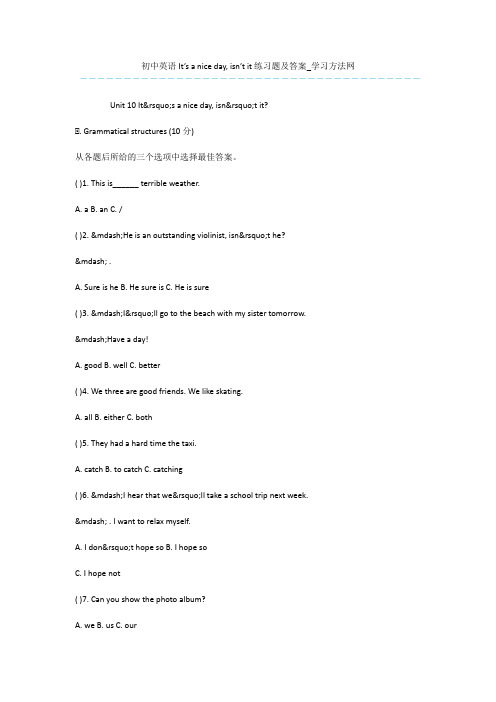
初中英语It’s a nice day, isn’t it练习题及答案_学习方法网---------------------------------------Unit 10 It’s a nice day, isn’t it?Ⅰ. Grammatical structures (10分)从各题后所给的三个选项中选择最佳答案。
( )1. This is______ terrible weather.A. aB. anC. /( )2. —He is an outstanding violinist, isn’t he?— .A. Sure is heB. He sure isC. He is sure( )3. —I’ll go to the beach with my sister tomorrow.—Have a day!A. goodB. wellC. better( )4. We three are good friends. We like skating.A. allB. eitherC. both( )5. They had a hard time the taxi.A. catchB. to catchC. catching( )6. —I hear that we’ll take a school trip next week.— . I want to relax myself.A. I don’t hope soB. I hope soC. I hope not( )7. Can you show the photo album?A. weB. usC. our( )8. What do you think of that new movie?A. It’s about some school students.B. It’s great! I want to see it again.C. It happened in 1998.( )9. My new math teacher is friendly me.A. toB. onC. for( )10. — you at home last night?—No, I .A. Are, am notB. Was, weren’tC. Were, wasn’tⅠ. Functions (5分)11. 请写出下列对话正确的排列顺序。
八年级下册-Unit-10--It’s-a-nice-day--isn’t-it---学案
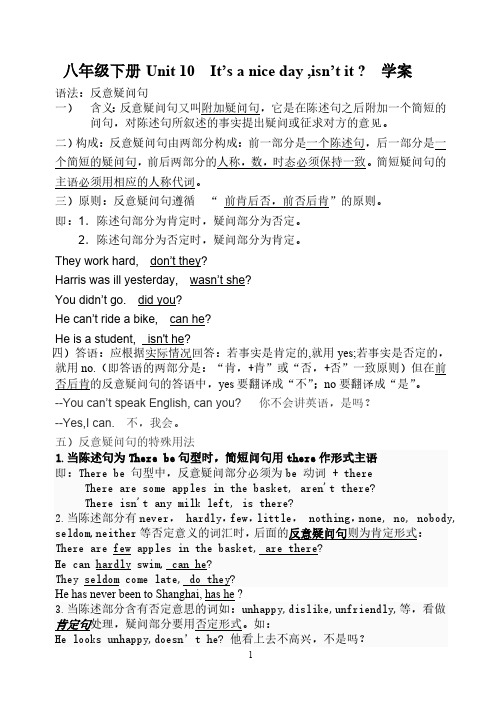
八年级下册Unit 10 It’s a nice day ,isn’t it ? 学案语法:反意疑问句一)含义:反意疑问句又叫附加疑问句,它是在陈述句之后附加一个简短的问句,对陈述句所叙述的事实提出疑问或征求对方的意见。
二)构成:反意疑问句由两部分构成:前一部分是一个陈述句,后一部分是一个简短的疑问句,前后两部分的人称,数,时态必须保持一致。
简短疑问句的主语必须用相应的人称代词。
三)原则:反意疑问句遵循“前肯后否,前否后肯”的原则。
即:1.陈述句部分为肯定时,疑问部分为否定。
2.陈述句部分为否定时,疑问部分为肯定。
They work hard, don’t they?Harris was ill yesterday, wasn’t she?You didn’t go. did you?He can’t ride a bike, can he?He is a student, isn't he?四)答语:应根据实际情况回答:若事实是肯定的,就用yes;若事实是否定的,就用no.(即答语的两部分是:“肯,+肯”或“否,+否”一致原则)但在前否后肯的反意疑问句的答语中,yes要翻译成“不”;no要翻译成“是”。
--You can’t speak English, can you? 你不会讲英语,是吗?--Yes,I can. 不,我会。
述句的主语是something, nothing, anything, everything等不定代词时,反意疑问部分的主语多用it。
如:No one knows him, do they?Someone is waiting for you, isn’t he?Nobody says a word about the accident, do they?Everything seems all right, doesn’t it?※简单的说:反意疑问句的结构:陈述句+简短疑问句\附加疑问句原则:1.前肯后否,前否后肯2.前名后代,时态一致3.不管问法,事实回答练习:()1. Don’t forget to give Polly some food and change her water,_______? A. shall we B. will you C. won’t you D. do you ()2. There is little juice in the glass, _________?A. is thereB. isn’t thereC. is it()3.---This bus is always late, _________? ---Sure, it is.A. is not itB. isn’t itC. isn’t the busD. doesn’t it ()4.---You’re new here, ________?----Yes, I’m from Dujiangyan. I came here last week.A. do youB. don’t youC. are youD. aren’t you()5. He has never watched such an important match , _____ he?A. hasn'tB. hasC. isD. isn't()6.They have to work at once,______ they?A. haveB. haven'tC. doD. don't()7. She often feels tired,______ she?A. doesn'tB. doesC. isD. isn't()8. Let's take a short rest, ______?A. do weB. aren't weC. will youD. shall we()9. Hundreds of people lost their lives in the accident,_______ they? A. don't B. didn't C. do D. did()10. ---Lily didn't come to school, did she? ---____. She wasill in bed. A. No, she did B. Yes, she did. C. No, she didn't.D. Yes, she didn't()11.---She isn't a teacher, is she? ---_____. She works in a hospital. A. No, she is B. Yes, she is. C. No, she isn't. D. Yes, she isn'tUnit 10 It’s a nice day ,isn’t it ? Section A学案(一). 学习目标1.四会本部分生词及短语:by noon, on the weekend, wait in line.2.掌握反意疑问句的结构,学会变反意疑问句。
Unit 10 It’s a nice day, isn’t it?
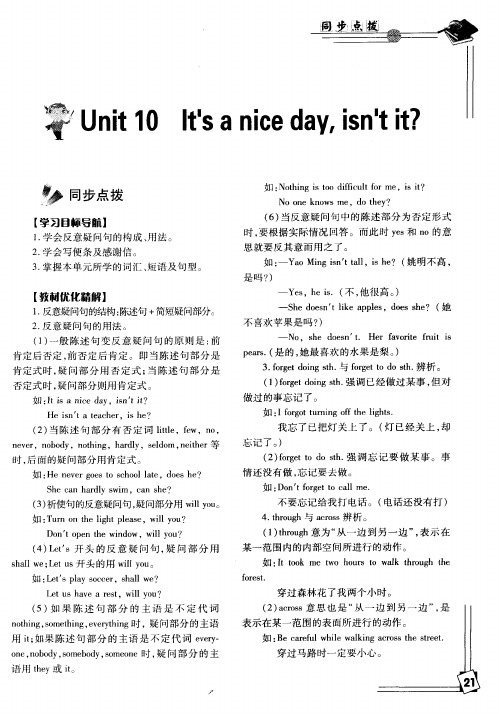
不要忘记给我打电话。( 电话 还 没有 打 ) 4 truh与 ars 辨 析 。 . og h c s o ( )hog 为 “ 一 边 到 另 一 边 ” 表 示 在 1 tr h意 u 从 ,
— —
a l to a ai m na ln g n.
一
Do or . Yo i u c e fy u d n t n tw r y uwl sced i o o l
—
yu o ?
ty n r i g.
如 : ro rigof h g t. If gtt nn f tel hs o u i
() 2 当陈述句 部 分有 否定 词 lt ,f ,n , il e te w o nvr nbd , o i , ad , e o n i e 等 ee, ooy nt n hrl sl m,e hr hg y d t 时 , 面的疑 问部分用肯定式 。 后
同步点 拨
【 学习目标导航】
1学 会 反 意 疑 问 句 的 构 成 、 法 。 . 用
() 6 当反意疑问句 中的陈述部分 为否定形式 时, 要根据实际情况 回答 。而此 时 ys n e 和 o的意
思 就 要 反 其 意 而 用 之 了。
2 学会写便 条及感 谢信 。 . 3 掌握本单 元所学 的词汇 、 . 短语 及句 型。
如 : e e o st c ol ae osh ? Hen vrg e osh o lt ,d e e
S e c n h r l wi ,c n s e h a a dy s m a h 7
我忘 了已把灯关上 了。( 已经关 上 , 灯 却
英语:Unit_10_It’s_a_nice_day,_isn’t_it课件(人教新目标八年级下)Section_A-1

Pairwork :Make a successful small talk.
You may use these expressions:
It’s really exciting, isn’t it ? You love basketball, don’t you? You like Yao Ming, don’t you?
A: It‟s really cold today, isn‟t it? B: Yes, it is. I hope the bus comes soon.
堂清内容
(1).look like 看起来像 (2).I hope so 我希望如此 (3). by noon 直到中午 (4).on the weekend 在周末 (5). the No .15 bus 第十五路公共汽车 (6).He sure is! 他确实是 (7).small talk 闲聊 (8).It’s really cold today, isn’t it?今天天气真冷,不 是吗?
闲聊 Culture Background: Small Talk
Do you sometimes talk with people you don‟t know? This kind of conversation is called Small talk . Small talk can be about anything, but often small and unimportant things like the
Discuss in fours : When we begin a small talk , we are asked to begin a successful one. Some sentences we can use, but some sentences we can’t use. Please tell us some unsuccessful small talk topics.
unit 10 it’s a nice day, isn’t it 同步练习(人教新目标八年级下) (1)

Unit 10 It’s a nice day, isn’t it【同步达纲练习】Ⅰ.单项选择。
( ) 1. Dick got up into a tree ___ he saw the bear.A.while B.as soon as C.until D.if ( ) 2. It’s a fine day, ___ it?A.is B.does C.doesn’t D.isn’t ( ) 3. Peter has taught ___ English for two years.A.him B.his C.himself D.he( ) 4. There is little water in the bottle, _____?A.is there B.isn’t there C.there is D.there isn’t ( ) 5. Don’t open the door, ___ ?A.shall we B.will you C.do you D.don’t you ( ) 6. Have some tea, ___?A.will you B.won’t you C.shall we D.have you ( ) 7. She needs to have the bike repaired, ___?A.does she B.doesn’t she C.need she D.needn’t she ( ) 8. Let’s go dancing, ___?A.shall we B.will you C.won’t you D.don’t we ( ) 9. I really can’t agree ___ you.A.to B.of C.with D.for ( ) 10. I prefer tea ___ coffee.A.to B.than C.without D.out ( ) 11. I won’t believe it ___ I see it with my own eyes.A.and B.that C.until D.if ( ) 12. Hurry up, ___ you’ll be late for school.A.but B.and C./ D.or ( ) 13. They aren’t from Japan, ___ they?A.aren’t B.are C.weren’t D.were ( ) 14. Did you hear ____?A.what I say B.what I said C.what did I say D.what do I say ( ) 15. Nobody says a word about the accident, ___?A.does he B.doesn’t he C.do they D.don’t theyⅡ.用括号里所给单词的适当形式填空。
鲁教版七年级英语下册UNIT 2 It’s a nice day, isn’t it检测题(附答案)
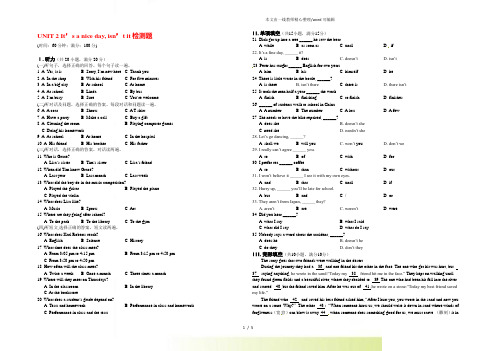
UNIT 2 It’s a nice day, isn’t it检测题(时间:60分钟;满分:100分)Ⅰ.听力(共20小题,满分20分)(一)听句子,选择正确的回答。
每个句子读一遍。
1. A. Yes, it is. B. Sorry, I’m new here. C. Thank you.2. A. In the shop. B. With his friend. C. For five minutes.3. A. In a big city. B. At school. C. At home.4. A. At school. B. Linda. C. By bus.5. A. I’m busy. B. Sure. C. You’re welcome.(二)听对话及问题,选择正确的答案。
每段对话和问题读一遍。
6. A. A coat. B. Shorts. C. A T-shirt.7. A. Have a party. B. Make a call. C. Buy a gift.8. A. Cleaning the room. B. Playing computer games.C. Doing his homework.9. A. At school. B. At home. C. In the hospital.10. A. His friend. B. His brother. C. His father.(三)听对话,选择正确的答案。
对话读两遍。
11. Who is Grace?A. Lisa’s sister.B. Tim’s sister.C. Lisa’s friend.12. When did Tim know Grace?A. Last year.B. Last month.C. Last week.13. What did the boy do in the music competition?A. Played the guitar.B. Played the piano.C. Played the violin.14. What does Lisa like?A. Music.B. Sports.C. Art.15. Where are they going after school?A. To the park.B. To the library.C. To the gym.(四)听短文,选择正确的答案。
八年级英语下册 unit 10 it’s a nice day, isn’t it 试卷_ 人教新目标版
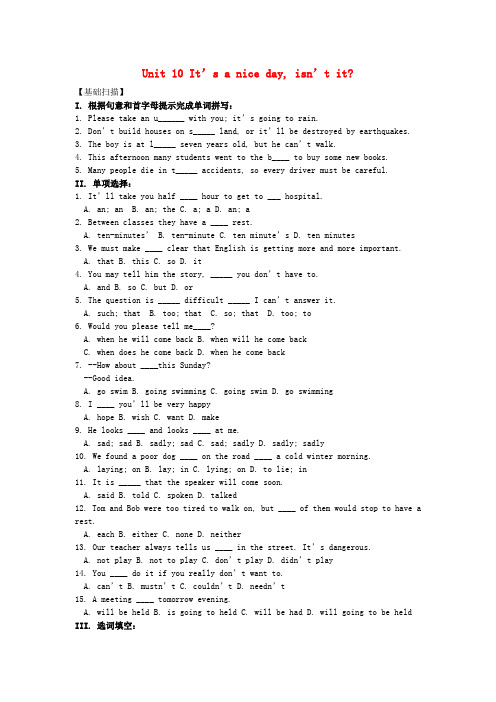
Unit 10 It’s a nice day, isn’t it?【基础扫描】I. 根据句意和首字母提示完成单词拼写:1. Please take an u______ with you; it’s going to rain.2. Don’t build houses on s_____ land, or it’ll be destroyed by earthquakes.3. The boy is at l_____ seven years old, but he can’t walk.4. This afternoon many students went to the b____ to buy some new books.5. Many people die in t_____ accidents, so every driver must be careful.II. 单项选择:1. It’ll take you half ____ hour to get to ___ hospital.A. an; anB. an; theC. a; aD. an; a2. Between classes they have a ____ rest.A. ten-minutes’B. ten-minuteC. ten minute’sD. ten minutes3. We must make ____ clear that English is getting more and more important.A. thatB. thisC. soD. it4. You may tell him the story, _____ you don’t hav e to.A. andB. soC. butD. or5. The question is _____ difficult _____ I can’t answer it.A. such; thatB. too; thatC. so; thatD. too; to6. Would you please tell me____?A. when he will come backB. when will he come backC. when does he come backD. when he come back7. --How about ____this Sunday?--Good idea.A. go swimB. going swimmingC. going swimD. go swimming8. I ____ you’ll be very happyA. hopeB. wishC. wantD. make9. He looks ____ and looks ____ at me.A. sad; sadB. sadly; sadC. sad; sadlyD. sadly; sadly10. We found a poor dog ____ on the road ____ a cold winter morning.A. laying; onB. lay; inC. lying; onD. to lie; in11. It is _____ that the speaker will come soon.A. saidB. toldC. spokenD. talked12. Tom and Bob were too tired to walk on, but ____ of them would stop to have a rest.A. eachB. eitherC. noneD. neither13. Our teacher always tells us ____ in the street. It’s dangerous.A. not playB. not to playC. don’t playD. didn’t play14. You ____ do it if you really don’t want to.A. can’tB. mustn’tC. couldn’tD. needn’t15. A meeting ____ tomorrow evening.A. will be heldB. is going to heldC. will be hadD. will going to be held III. 选词填空:1. The party will begin ______ about ten minutes.2. Hundreds of people ______ their lives in the flood, didn’t they?3. Don’t read in the sun. It’s bad ______ your eyes.4. He is one of ______ experienced teachers in our school.5. That digital camera is a bit expensive, so I want to take this _____ one.6. ______ you eat too much meat, you will get fat.7. Can you show me ______ to do it?8. That piece of music ______ terrible.9. Nothing can ______ me from changing my mind.10. Though she has no children, she never feels11. British people _____ 35 and 65 watch television for about three hours a day.12. The lake is dirty. We _____ swim in it.13. I found _____ very interesting to travel with my friends.14. The soup ______ wonderful.15. _______ having a glass of orange?IV. 句型转换:1. Wherever he is, l will try to find him.______ ______ _____ he is, I’ll try to find him.2. Why not ask the teacher to help you?Why _____ ______ask the teacher for help?3. I can’t decide which one I shall choose.I can’t decide which one _____ ______.4. He is too young to go to school.He is _____ ______ ______to go to school.5. He is the tallest boy in his class.He is taller than _____ _____ _____ in his class.【能力冲浪】I. 补全对话(在空白处填1至3个单词):A: Can I help you?B: Yes, please. Today is Mother’s Day. I ____________________(1) a present for my mother, but I have no idea what to buy?A: Maybe you can buy her some flowers.B: Great! But ______________________ (2) shall I buy, roses or carnations(康乃馨)?A: I think carnations are better. They ___________________ (3) happiness, sweetness and love. They are for mothers.B: _________________(4) are they?A: Thirty yuan a bunch(束).B: OK, I’ll take it. ___________________________(5).A: Thank you and best wishes to you mother.II. 完形填空:BYour watch always tells you what time it is now. Strange things happen to __1__ when you travel. Because the earth is divided into (划分为……) twenty-four time zones (时区), one hour apart.You can have days with more or __2__ than twenty-four hours, and weeks with more or less than __3__ days.If you make a five-day journey __4__ the Atlantic Ocean (大西洋), your journey enters a different time zone every day. As you enter each zone, the time changes __5__.Traveling __6__, you set your watch back; traveling __7__, you set it forward. Each day of your journey has __8__ twenty-five __9__ twenty-three hours.If you travel __10__ ship across the Pacific (太平洋), you cross the international (国际的) dateline. There a new day begins. When you cross the line, you change your calendar (日历) __11__, backward or __12__. Traveling __13__ today becomes yesterday, traveling __14__, it is __15__.1. A. clock B. the earth C. time D. watch2. A. little B. more C. fewer D. few3. A. six B. seven C. eight D. five4. A. across B. in C. through D. on5. A. twenty-four hours B. one hour C. half an hour D. one and a half hours6. A. east B. west C. north D. south7. A. east B. west C. north D. south8. A. all B. neither C. both D. either9. A. and B. but C. or D. nor10. A. on B. in C. by D. with11. A. two days B. one full day C. half a day D. one and a half days12. A. forward B. before C. ago D. after13. A. east B. west C. north D. south14. A. north B. east C. south D. west15. A. today B. the day before yesterday C. tomorrow D. the day after tomorrow III. 阅读理解:AMr. Evans works in Sydney. Last week he had a two-week holiday, but he didn’t know where to go. He said to his friend Robert, “I hate the hot weather here, but I can’t think of a cool place in Australia. Where shall I take my holiday?”“That’s easy,” said Robert, “You can go to Moscow. Snow and ice are covering the ground there now.”Mr. Evans agreed with his friend. He bought a plane ticket and soon arrived in Moscow. He was having a good time there, but one day he got into trouble(麻烦). After lunch, he went to a park outside the city. He noticed a dog following him when he was walking past a house. It was hungry and wanted some food to eat. But Mr. Evans had no food in his pockets. He tried to shoo (以嘘声吓走) it away, but it began to bark at him. Just at that moment, he saw a stone on the ground. He tried to pick it up, buthe couldn’t.“How strange these Russians are!” Mr. Evans said to himself, “They do not tie up(拴住)their dogs, but firmly(牢牢地)tie down the stones!”1. Mr. Evans is________.A. AmericanB. RussianC. AustralianD. Chinese2. Mr. Evans didn’t like the ________in Australia.A. hot weatherB. cool weatherC. rainy weatherD. cold weather3. Mr. Evans went to Moscow________.A. by trainB. by busC. by airD. on foot4. The word “bark” means “________”.A. 跳B. 叫C. 追D. 咬5. Mr. Evans couldn’t pick up the stone because________.A. it was too coldB. it was too heavyC. the Russians tied their stones to the groundD. it was not a stoneBIn Britain, the weather never gets too hot or too cold. There is not a great difference between summer and winter. Why is this?Britain has a warm winter and a cool summer because it is an island country. In winter the sea is warmer than the land. The winds from the sea bring warm air to Britain. In summer the sea is cooler than the land. The winds from the west blow over Britain all the year. They blow from the southwest across the Atlantic Ocean (大西洋). They are wet winds. They bring rain to Britain all the year, so Britain has a lot of rainy weather. The west of Britain is wetter than the east. The winds must blow across the high land in the west.6. What’s the weather like in Britain?A. It’s no t too hot or too cold.B. It’s too hot and too cold.C. It’s very bad.D. We don’t know.7. When do the winds bring cool air to Britain? In ________.A. springB. summerC. autumnD. winter8. Why is the weather in summer and in winter almost the same? There________.A. is no difference between summer and winterB. is sea air around this countryC. are winds from the high landD. is much rain in the Atlantic Ocean9. Which of the following is right?A. There is more rain in the east than in the west.B. There is as much rain in the west as in the east.C. There is less rain in the east than in the west.D. There isn’t so much rain in the west as in the east.10. This passage mainly tells us________.A. the season on BritainB. the rain in BritainC. the weather in BritainD. the winds in BritainCSandra is twenty years old. She comes from Santiago, the capital city of Chile.She lives with her aunt’s family in Manhattan, a part of New York. There are five people in the family -her aunt, her uncle and her three cousins. Her parents and two brothers still live in Santiago. Her brothers want to come to the United States, but her parents are going to stay in Santiago. Sandra works in a small shop on Broadway. One of her cousins owns the shop. She works six days a week from ten in the morning till eight at night. The job isn’t hard but the hours are long and the pay is low. Sandra wants to get a better job, but she doesn’t know English. If you don’t know English, it’s almost impossible to get a good job.Life in New York City isn’t easy for Sandra. The weather is cold, the Americans seem cold, and sometimes her room is cold. When she comes home from work, she thinks about her parents, brothers and friends in Santiago. Sometimes she cries a little. She dreams of going back, but she can’t. In Santiago the weather is warm and the people are friendly, but there are no jobs there for Sandra.11. What country is Sandra from?A. The USAB. JapanC. GreeceD. Chile12. Sandra has to work ______ a week.A. five daysB. six daysC. four daysD. seven days13. Why can’t Sandra get a better job in the USA?A. Because she does not work hard.B. Because her cousins don’t want to help her.C. Because her English is poor.D. Because she is not an American girl.14. The sentence “the Americans seem cold” means that______.A. the people in the USA do not seem to be friendlyB. the American people are afraid of winterC. it is cold in New YorkD. the weather is cold in Manhattan15. Why can’t Sandra go back to Santiago?A. Because her parents don’t want her to go back.B. Because she can’t find any job in Santiago.C. Because her brothers want to come to America.D. Because one of her cousins wants her to work in his shop.IV. 书面表达:根据所给的中英文提示,写出一篇符合逻辑、语言通顺的日记(开头已给出)。
Unit 2 It’s a nice day, isn’t 重点单词详解
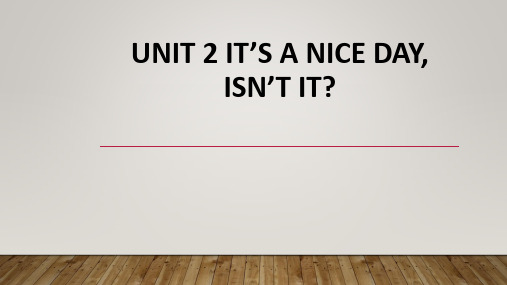
outside. • By any chance 或许、可能(多用于疑问句)Are you love in him, by any chance?
14. GENERAL 【ADJ】
• 1)普遍的、普通的 the general opinion/ belief 普遍看法、信仰 • 2)非专门的、一般性的 a general hospital 综合性医院 general education 普通教育 • 3)大致的、笼统的 They gave a general description of the thief. • 4)总管的、首席的 the general manager 总经理 • In general 总的来说、从总体上看 In general, Japanese cars are very reliable.
11. AVOID 【VT】
• 1)避免、防止 avoid+doing I try to avoid going shopping on Saturday. • 2)躲避、避开 He has been avoiding me all week. 整整一星期他都在躲着我。 • avoidable【adj】可避免的
12. THEREFORE【ADV】因此、所以
• He is only 17 and therefore he has no right to vote. • It rained yesterday, therefore the football match was put off.
初二Unit 10 It’s a nice day, isn’t it
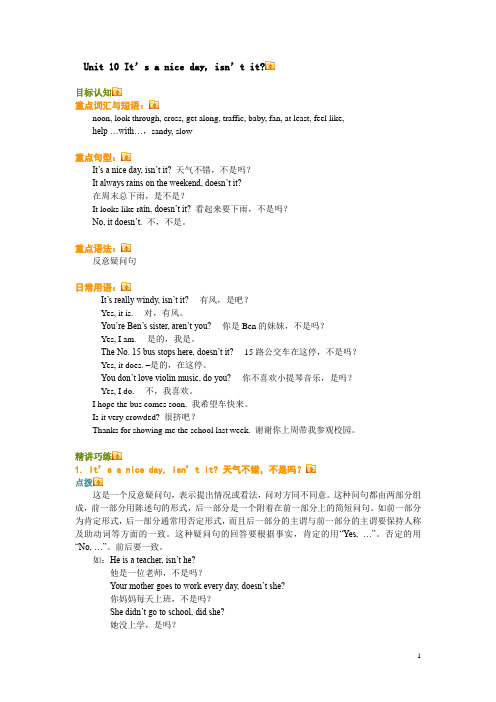
Unit 10 It’s a nice day, isn’t it?目标认知重点词汇与短语:noon, look through, cross, get along, traffic, baby, fan, at least, feel like,help …with…,sandy, slow重点句型:It’s a nice day, isn’t it? 天气不错,不是吗?It always rains on the weekend, doesn’t it?在周末总下雨,是不是?It looks like r ain, doesn’t it? 看起来要下雨,不是吗?No, it doesn’t. 不,不是。
重点语法:反意疑问句日常用语:---It’s really windy, isn’t it? ---有风,是吧?---Yes, it is. ---对,有风。
---You’re Ben’s sister, aren’t you? ---你是Ben的妹妹,不是吗?---Yes, I am. ---是的,我是。
---The No. 15 bus stops here, doesn’t it? ---15路公交车在这停,不是吗?---Yes, it does. –是的,在这停。
---You don’t love violin music, do you? ---你不喜欢小提琴音乐,是吗?---Yes, I do. ---不,我喜欢。
I hope the bus comes soon. 我希望车快来。
Is it very crowded? 很挤吧?Thanks for showing me the school last week. 谢谢你上周带我参观校园。
精讲巧练1. It’s a nice day, isn’t it? 天气不错,不是吗?点拨这是一个反意疑问句,表示提出情况或看法,问对方同不同意。
unit 10 it’s a nice day,isn’t it教案1(鲁教版七年级下)
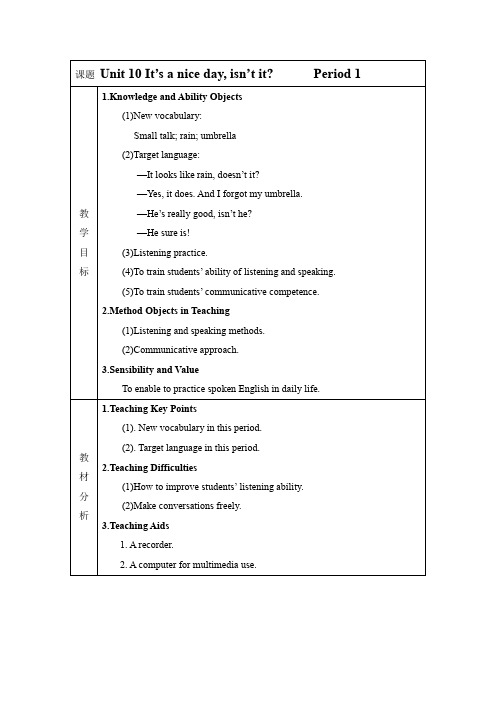
课题Unit 10 It’s a nice day, isn’t it? Period 1教学目标1.Knowledge and Ability Objects(1)New vocabulary:Small talk; rain; umbrella(2)Target language:—It looks like rain, doesn’t it?—Yes, it does. And I forgot my umbrella.—He’s really good, isn’t he?—He sure is!(3)Listening practice.(4)To train students’ ability of listening and speaking.(5)To train students’ communicative competence. 2.Method Objects in Teaching(1)Listening and speaking methods.(2)Communicative approach.3.Sensibility and ValueTo enable to practice spoken English in daily life.教材分析1.Teaching Key Points(1). New vocabulary in this period.(2). Target language in this period.2.Teaching Difficulties(1)How to improve students’ listening ability.(2)Make conversations freely.3.Teaching Aids1. A recorder.2. A computer for multimedia use.板书设计示意框图Unit 10 It’s a nice day, isn’t it?A list of places: parkbus stopcinemashoplift…时序Teaching ProceduresStep Ⅰ Greetings and RevisionGreet the class as usual and check the homework.Step II New wordsShow the new words on the screen and teach the new words.Ask students to read the new words first. Then correct the pronunciation. Teach the new words and ask students to repeat. Make sure students can understand the meanings.Step III Section A 1aThis activity introduces several examples of small talks.Show each picture on the screen and ask different students to say what is happening in each picture.T: Look at the pictures. Can you tell me what’s happening in each picture?S1: In Picture a, many people are waiting in line to buy tickets.S2: In Picture b, so many people are at the subway station. It’s already nine o’clock, but the train isn’t here. They are very worried.S3: The boy and the man are waiting for the train in Picture c.S4: In the last picture, we can see some persons listening to the concert.T: Very good. In all pictures, two people who don’t know each other are startinga conversation. Can you tell me other places where we would talk topeople we don’t know?S5: On the bus, in the lift.S6: In the park, at the bus stop.…Call on a student to write his/her list of places on the board. Ask other students to add places to this list. Let students discuss the completed list.Step IV 1bActivity 1b gives students practice in understanding the target language in spoken conversation. In this activity ask students to listen and number thepictures (2-4). Play the recording for twice. Students write the number ofeach conversation in the box next to the correct picture. Then check theanswers.Answers:Picture a: Conversation 2Picture b: no matchPicture c: Conversation 3Picture d: Conversation 1Tapescript:Conversation 1Girl 1: He’s really good, isn’t he?Girl 2: He sure is! I come to all his concerts.Girl 1: Do you have his new CD?Girl 2: Yes, I do.Conversation 2Girl 3: This line is moving slowly, isn’t it?Woman: Yes, it is. We’ve been here for 20 minutes already.Girl 3: I hope the movie is good.Woman: So do I. Do yo u think it’s going to rain?Girl 3: I hope not!Woman: Me, too.Conversation 3Boy: The train is late, isn’t it?Man: No, today is Sunday. The trains only run twice an hour on weekdays.Boy: Oh, I didn’t know that. I usually take th e train on weekdays.Step V 1c PairworkThis activity provides guided oral practice using the target language.Ask students to look at the pictures on the screen one by one. Get students towork in pairs. Make their own conversations about the people in the pictures.As students talk, move around the room checking their work.Sample conversation:A: You love violin music, don’t you?B: Yes. What about you?A: Me, too. / So am I.Step VI SummaryT:This class we’ve learned some new words and the target language. In the United States, people who don’t know each other often start conversation in public places. This small talk can help people feel more comfortable. In some places, especially in small cities and towns, people feel it is polite to speak with people they don’t know. Do you often have small talks with people you don’t know? If you have small talks with people in English, I think you can improve your spoken English greatly.Step VII HomeworkT: Write down the sentences in activity 1c in your exercise books.教学后记课题Unit 10 It’s a nice day, isn’t it? Period 2教学目标1.Knowledge and Ability Objects(1)New vocabulary:Noon; Franklin lake; on the weekend(2)Target language:—It’s really cold today, isn’t it?—Yes, it is. I hope the bus comes soon.(3)Listening practice.(4)To train students’ ability of listening and speaking.(5)To train students’ ability of communication.2.Method Objects in Teaching(1)Listening and speaking methods.(2)Communicative approach.3.Sensibility and ValueTo enable to understand the feelings of others in communication.教材分析1.Teaching Key Points(1). Key phrases: by noon; on the weekend; I hope so.(2). Master the structures in Grammar Focus.2.Teaching DifficultyMake conversations using the target language in Grammar Focus.3.Teaching Aids1. A recorder.2. A computer.板书设计示意框图Unit 10 It’s a nice day, isn’t it?successful / unsuccessfulHe is a good student, isn’t he?Li Ping likes music, doesn’t he? You take this bus, don’t you? No, I don’t.Yes, I do.时序Teaching ProceduresStep Ⅰ Greetings and RevisionGreet the class as usual and check the homework. Ask students to show their written work.Step II New wordsShow the new words on the screen and teach the new words.Step III 2aActivity 2a provides guided listening practice using the target language.First write successful and unsuccessful on the board.T: Do you know what’s the meaning of the word “ successful”?S1: Yes. I think it means “ having done well”.T: Great. What about the word “unsuccessful”?Ss: We are not sure.T: It means “not successful”. Clear?Ss: Yes.T: To have successful small talks, both people need to ask questions. Now listen to the three conversations. Are they examples of successful orunsuccessful small talks? Write “a” or “u” in the blanks.Play the recording the first time. Students only listen.Then play it a second time. This time students write “s” or “u” in the blanks.Check the answers.Answers:Conversation 2: u Conversation 3: sTapescriptConversation 1Boy 1: hate waiting for the bus.Girl 1: So do I.Boy 1: I’m going to be late to school.Girl 1: So am I.Conversation 2Man 1: These shirts are really expensive, aren’t they?Woman 1: Yes, they are.Man 1: The prices in this store are too high.Woman 1: Yes, they are.Conversation 3Girl 2: It always rains on the weekend, doesn’t it?Boy 2: Yes. It rains every Saturday! Do you think it’ll stop by noon?Girl 2: I hope so. I want to go swimming.Boy 2: Oh? Where do you swim?Girl 2: At Franklin Lake. Do you ever go there?Step IV 2bT: Listen to conversation 3 again. Put the sentences and questions in order. First I’ll ask different students to read the lines of the conversation to you. Thesample answer “f” is gi ven. This is the opening line of the conversation.Play the recording. Ask students to write the letter of each line of conversation in the correct place.Check the answers.Answers:1. f2. b3. e4. a5. d6.c7. gStep V 2c PairworkThis activity provides guided oral practice using the target language.T: First I’ll ask a pair of students to read the conversation in Activity 2b.Sa: It always rains on the weekend, doesn’t it?Sb: Yes. It rains every Saturday.Sa: Do you think it’ll stop by noon?Sb: I hope so. I want to go swimming.Sa: Oh? Where do you swim?Sb: At Franklin Lake.Sa: Do you ever go there/(Write two phrases and a sentence on the board: on the weekend; by noon; Ihope so.)T: In the conversation, there are two important phrases and a key structure.Please look at the board, “on the weekend” means “on Saturday and onSunday” and “I hope so” means “I hope it will stop by noon”. Pleaseremember them. Now practice the conversation in pairs.(After a while)T: OK. Now it’s your turn to make your own small talks. You can use the questions in the box.As students talk to each other, move around the room checking their work.In the end ask several pairs to come to the front of the room and say their conversations to the class.Step V Grammar FocusReview the grammar box. Ask students to read the questions and answers. Ask students to copy the three sets of questions and answers in their exercise books.Then show the following on the screen.It’s really windy today, isn’t it?Yes, it is.You’re Ben’s sister, aren’t you?Yes, I am.The No. 15 bus stops here, doesn’t it?Yes, it does.Step VI Grammar NotePoint out that tag questions are a simple, direct way to start a conversation. Because tag questions ask for a short answer (Yes, I do. No, it isn’t.), they are easy to answer and give two people who don’t know each other a comfortable way to start talking.Step VII SummaryT:This class we’ve learned what one says to start a small talk. I hope you can start a small talk with strangers. In this way you can practice your spoken English and make a lot of friends.Step VIII HomeworkT: Tape record yourselves as you read your conversations for Activity 2c.教学后记课题Unit 10 It’s a nice day, isn’t it? Period 3教学目标1.Knowledge and Ability Objects(1)New vocabulary:Have a good day; look through; bookstore; elevator; cross; low; slow; sandy(2)Target language:Their prices are really low, aren’t they?This line is slow, isn’t it?Nice day, isn’t it?(3)Writing practice.(4)To train students’ writing ability.(5)To train students’ communicative compete nce.2.Method Objects in Teaching(1)Writing method.(2)Communicative approach.3.Sensibility and ValueTo enable to understand the feelings of others in communication.教材分析1.Teaching Key PointsMaster the target language in this period.(1). Have a good day!(2). Look through;(3). Nice day, isn’t it?2.Teaching DifficultiesMake conversations freely.3.Teaching Aids1. A computer.2. A tape recorder.3. Some pictures.板书设计示Unit 10 It’s a nice day, isn’t it?Their prices are r eally low, aren’t they? This line is slow, isn’t it?Nice day, isn’t it? = It’s a nice day, isn’t it?意框图Look through; wait in line; wait to do sth.; cross a … street时序Teaching ProceduresStep Ⅰ Greetings and RevisionGreet the class as usual and check the homework.Ask students to place the tapes and the tape recorder where students in the class can listen to each other’s conversations during free time.Step II New wordsShow the new words on the screen. Teach the new words.Ask students to read the new words first and then correct the pronunciation. Have students read for several times.Step III 3aThis activity provides reading and writing practice using the target language.(Show a picture on the screen.)T: Look at the picture. Where are they?Ss: They are at the bus stop.T: Yes. They are having a small talk while they are waiting for buses. Now let’s look at their conversation. In it there are four blanks. You need to fill inthem. First please think of answers that would be correct in blank 1.S1: I’m going to the beach.S2: I always go to the beach on hot days.T: Correct. Very good. Then finish writing sentences in the blanks on your own.Ask some students to say their sentences to the class.In the end invite some students to read their completed conversations to theclass.Write some of the new sentences students use on the board and discuss the sentences with the class.Step IV 3b PairworkActivity 3b provides writing and speaking practice using the target language.First show the conversation in 3a on the screen and ask students to read it.A: This is great weather, isn’t it?B: It sure is. But it’s a little hot for me.A: Oh, I love hot weather. I’m going to the beach today.B:Which beach are you going to?A: I’m going to Today Beach. Where do you usually go?B: I usually go to Sandy Beach.A: Is it very crowded?B: No, it’s never crowded. Well, ha ve a good day!A: Thanks. Goodbye.B: Goodbye.T: Look at the conversation on the screen. Read it together.Ss: …(Show the situations on the screen while students are reading.)·Two people looking through books in a bookstore.·Two people waiting in line to buy ice cream.·Two people alone in an elevator.·Two people waiting to cross a busy street.(Write the questions on the board.)·Their prices are really low, aren’t they?·This line is slow, isn’t it?·Nice day, isn’t it? (= It’s a nice day, isn’t it?)T: Please read the situations together.Ss: …T: Do you know the meanings of the underlined phrases?S3: “look through” means “read quickly”.S4: “Wait in line” means “wait in a row of people”.…(Write the phrases on the board.)T: Now please write a new conversation together using your own ideas. You can use the situations on the screen. And the questions on the board can helpyou.As they make their own conversation, move around the room offering assistance as needed.In the end of this activity ask pairs of students to say their conversations for the class. Step V An ActivityHow Long Can You Talk?Divide the class into several teams of four to five students each. Ask each team to write down a list of opening questions they might use to start aconversation. Then ask sets of two teams to work together. One team givesan opening question. The other team must give an answer and then follow itup with a question to the first team. The first team then answers and tries toask another question. The two teams continues the conversation this way aslong as possible.Step VI 4 GroupworkThis activity provides guided oral and writing practice using the targetlanguage.First show students some pictures ( a student, a farmer, an old man and abusinessman).Ask students to identify the people.Then ask students to give sample topic of conversation. Topics should besuitable for each person.Have students work in groups and role play the conversation.Ask a few students to share the conversations with the rest of the class.Step VI SummaryT:This class we’ve done some writing practice. We know how to start a small talk with different people.Step VII HomeworkWrite the conversations in Activity 3b in your exercise books.教学后记课题Unit 10 It’s a nice day, isn’t it? Period 4教学目标1.Knowledge and Ability Objects(1)New vocabulary:Have a good day; look through; bookstore; elevator; cross; low; slow; sandy(2)Target language:Their prices are really low, aren’t they?This line is slow, isn’t it?Nice day, isn’t it?(3)Writing practice.(4)To train students’ writing abil ity.(5)To train students’ communicative competence.2.Method Objects in Teaching(1)Writing method.(2)Communicative approach.3.Sensibility and ValueTo enable to understand the feelings of others in communication.教材分析1.Teaching Key PointsMaster the target language in this period.(1). Have a good day!(2). Look through;(3). Nice day, isn’t it?2.Teaching DifficultiesMake conversations freely.3.Teaching Aids1. A computer.2. A tape recorder.3. Some pictures.板书设计示意框图Unit 10 It’s a nice day, isn’t it?Their prices are really low, aren’t they?This line is slow, isn’t it?Nice day, isn’t it? = It’s a nice day, isn’t it?Look through; wait in line; wait to do sth.; cross a … street时序Teaching ProceduresStep Ⅰ Greetings and RevisionGreet the class as usual and check the homework.Ask students to place the tapes and the tape recorder where students in the class can listen to each other’s conversations during free time.Step II New wordsShow the new words on the screen. Teach the new words.Ask students to read the new words first and then correct the pronunciation. Have students read for several times.Step III 3aThis activity provides reading and writing practice using the target language.(Show a picture on the screen.)T: Look at the picture. Where are they?Ss: They are at the bus stop.T: Yes. They are having a small talk while they are waiting for buses. Now let’s look at their conversation. In it there are four blanks. You need to fill inthem. First please think of answers that would be correct in blank 1.S1: I’m going to the beach.S2: I always go to the beach on hot days.T: Correct. Very good. Then finish writing sentences in the blanks on your own.Ask some students to say their sentences to the class.In the end invite some students to read their completed conversations to the class.Write some of the new sentences students use on the board and discuss the sentences with the class.Step IV 3b PairworkActivity 3b provides writing and speaking practice using the target language.First show the conversation in 3a on the screen and ask students to read it.A: This is great weather, isn’t it?B: It sure is. But it’s a little hot for me.A: Oh, I love hot weather. I’m going to the beach today.B:Which beach are you going to?A: I’m going to Today Beach. Where do you usually go?B: I usually go to Sandy Beach.A: Is it very crowded?B: No, it’s never crowded. Well, have a good day!A: Thanks. Goodbye.B: Goodbye.T: Look at the conversation on the screen. Read it together.Ss: …(Show the situations on the screen while students are reading.)·Two people looking through books in a bookstore.·Two people waiting in line to buy ice cream.·Two people alone in an elevator.·Two people waiting to cross a busy street.(Write the questions on the board.)·Their prices are really low, aren’t they?·This line is slow, isn’t it?·Nice day, isn’t it? (= It’s a nice day, isn’t it?)T: Please read the situations together.Ss: …T: Do you know the meanings of the underlined phrases?S3: “look through” means “read quickly”.S4: “Wait in line” means “wait in a row of people”.…(Write the phrases on the board.)T: Now please write a new conversation together using your own ideas. You can use the situations on the screen. And the questions on the board can helpyou.As they make their own conversation, move around the room offering assistance as needed.In the end of this activity ask pairs of students to say their conversations for the class.Step V An ActivityHow Long Can You Talk?Divide the class into several teams of four to five students each. Ask each team to write down a list of opening questions they might use to start aconversation. Then ask sets of two teams to work together. One team givesan opening question. The other team must give an answer and then follow itup with a question to the first team. The first team then answers and tries toask another question. The two teams continues the conversation this way aslong as possible.Step VI 4 GroupworkThis activity provides guided oral and writing practice using the targetlanguage.First show students some pictures ( a student, a farmer, an old man and abusinessman).Ask students to identify the people.Then ask students to give sample topic of conversation. Topics should besuitable for each person.Have students work in groups and role play the conversation.Ask a few students to share the conversations with the rest of the class.Step VI SummaryT:This class we’ve done some w riting practice. We know how to start a small talk with different people.Step VII HomeworkWrite the conversations in Activity 3b in your exercise books.教学后记课题Unit 10 It’s a nice day, isn’t it? Period 5教学目标1.Knowledge and Ability Objects(1)New vocabulary:cost; yeah(2)Target language:—You are Jenny’s friend, aren’t you?—Yes, I am.—This is a great party, isn’t it?—Yes, it is.(3)Listening practice.(4)To train students’ ability of listening and speaking.(5)To train students’ communicative competence.2.Method Objects in Teaching(1)Listening and speaking methods.(2)Communicative approach.3.Sensibility and ValueTo be interested in taking part in all kinds of activities in an English class.教材分析1.Teaching Key Points(1). Key structure:—This is a great party, isn’t it?—Yes, it is.(2). Listening practice.2.Teaching DifficultiesRole play a small talk freely.3.Teaching Aids1. A tape recorder.2. A computer.板书设计示意框图Un it 10 It’s a nice day, isn’t it?—This is a great party, isn’t it?— Yes, it is.时序Teaching ProceduresStep Ⅰ Greetings and RevisionGreet the class as usual and check the homework. Ask students to show their written work.Step II New wordsLearn the new words.First show the new words on the screen. Teach the new words. Ask students to read for several times.Step III Section B 1aThis activity helps students understand what topics are good or not good in small talk situations.Focus attention on the four pictures. Point to the pictures one by one. Ask a student to read the question under each picture to the class.Then have students check the questions that they think are good small talk questions.Ask students to discuss their answers.The first and third pictures should be checked.Step IV An ActivityGood or Bad?Ask students to choose small talk topics and make lists of good and bad small talk questions about each topic. For example, if the topic is clothing, a badquestion would be, That shirt was expensive, wasn’t it? A good questionwould be, You bought that shirt at the new store downtown, didn’t you?Give students time to write questions for a topic they choose. Then havestudents read their sentences to the class, and have the other students callout Good or Bad after each statement.Step V 1b PairworkActivity 1b provides guided oral practice using the target language.Look at the sample conversation in this activity and ask two students to read it to the class.Sa: Do you like thrillers?Sb: No, but I love comedies.T: Thank you. OK, now work with your partner. Make your own conversations about the people in Activity 1a.As students talk, move around the room checking their work.Step VI 2aThis activity gives students practice in understanding the target language in spoken conversation.T: Now you’ll hear three conversations. The people in each conversation are in a different place. Write your answers in these spaces. (Point out the space andthe sample answer.) For example, The people in conversation 1 are at aparty.Then play the recording for students.Check the answers.Conversation 2: at schoolConversation 3: at a ball gameTapescriptConversation 1Woman 1: You’re Jenny’s friend, aren’t you?Girl 1: Yes, I am. My name is Rita. And you’re Jenny’s mom, aren’t you?Woman 1: That’s right. So tell me about yourself, Rita. Do you play any sports?Girl 1: Yes, I do. I like sports. I play tennis and ping-pong. And I love swimming.Woman 1: That’s great. Would you like something to drink?Girl 1: Yes, please. I’d love some lemonade.Conversation 2Boy 1: You’re new here, aren’t you?Boy 2: Yes, I am. My name’s Bill. You’re Tony, aren’t you?Boy 1: That’s right. What do you think of the school?Boy 2: It’s great. Have you always gone to this school?Boy 1: No, I haven’t. I started here last year.Conversation 3Boy 3: It’s really crowded, isn’t it?Boy 4: Yes, it is. Are you a ball game fan?Boy 3: Yes, I am. Say, did you see the game on TV Friday night?Boy 4: Yeah! It was really exciting, wasn’t it?Step VII 2bThis activity provides listening practice using the target language.Tell students this time they are going to match each question with the correct answer.Then point out the sample answer. Students read the sample question and answerthemselves.Play the recording.Students write the letter in correct blank.Stop the recording after each line or two to give students a chance to finish writing in their books.Then check the answers with the whole class.Step VIII 2c PairworkThis activity provides oral practice using the target language.T: Look at the openers in the box. Read them together.Ss: …( While students reading, teacher write the second one on the board.)T: Pay attention to the second one. In it, “isn’t this” isn’t used. Instead, “isn’t it”is used.Clear?Ss: Yes.T: Now make your own small talk conversations in pairs using the openers. The sample conversation is given. Please read it first.As they work, move around the room checking progress and offering help as needed.Ask several pairs to say their completed conversations for the class.Step IX SummaryT:This class we’ve had some listening and speaking practice using the target language. I hope all of you take an active part in the activities in class. In this way you can improve your spoken English.Step X HomeworkT: Preview the new words in the next page.教学后记。
八年级英语Unit_10_It’s_a_nice_day__isn’t_it可用)

我忘了我的雨伞。
你认为正午之前它将会停吗?化学老师有些严肃但其他的都好当开始和陌生人交谈时感到不确信是很自然的我转向我身边的人并且自我介绍他害羞的回答完成下列附加疑问句,每空一词。
11. You were really happy to meetCarlos, ________ ________?12. She has nothing to do here, ________ ________?13. They went to Sunny Beach, ________ ________?14. Linda hasn’t been to Beijing, ________________?15. There are two new American students in your class, ________ ________?16. She’s Tom’s cousin, ________ ________? (完成附加疑问句)17. I’ll think of you as we watch the White Socks win the game. (对划线部分提问)________ ________ you think of me?18. How much did the T-shirt cost you? (改为同义句)How much did you ________ ________ the T-shirt?19. I have ever seen the three astronauts with my own eyes. (改为否定句)I have ________ ________ the three astronauts with my own eyes.20. Did you have a good time at Franklin Lake? (改Did you ________ ________ at Franklin Lake?.单项选择1. Don’t ________ the road when the traffic lights are red.A. crossB. acrossC. pastD. through2. Our English teacher is friendly ________ us. We all like him.A. fromB. toC. withD. at3. The map makes ________ easier for us to travel around the city.A. themB. thisC. thatD. it4. —They went to school late, didn’t they?—________. The teacher asked them to be at school earlier next time.A. Yes, they didB. No, they weren’tC. Yes, they wereD. No, they didn’t5. —She’s really good, isn’t she?—________.A. She is sureB. She isn’t sureC. She sure isD. She sure not完形填空。
旧人教版初中英语教材

旧人教版初中英语教材篇一:初中英语教材目录(人教版)初中英语教材目录(人教版)七年级上册目录Starter Unit 1 Good morning!(早上好!)──be 动词的用法Starter Unit 2 What’s this in English?(用英语说这是什么?)——代词的用法(人称代词和物主代词)Starter Unit 3 What color is it?(它是什么颜色?)——名词的复数用法(一)Unit 1 My name’s Gina.(我的名字是吉娜)——介词短语的用法(on,in,under,behind,next to,between)Unit 2 This is my sister.(这是我姐妹)——动词have的用法。
Unit 3 Is this your pencil?(这是你的铅笔吗?)——动词like的用法和一般现在时的用法Unit 4 Where's my schoolbag?(我的书包在哪儿?)——数词的用法Unit 5 Do you have a soccer ball?(你有足球吗?)——序数词的用法Unit 6 Do you like bananas?(你喜欢香蕉吗?)——表达愿意、爱好和want的用法Unit 7 How much are these socks?(这双短袜多少钱?)——情态动词can的用法Unit 8 When is your birthday?(你的生日是什么时候?)——时刻表达法和感叹句的用法Unit 9 My favorite subject is science.(我最喜爱的科目是科学。
)——特殊疑问词的用法七年级下册目录Unit 1 Can you pay the guitar?(你会弹吉他吗?)——一般现在时Unit 2 What time do you go to school?(你什么时候去上学?)——There be 句型Unit 3 How do you get to school?(你怎样去学校?)——形容词的用法Unit 4 Don't eat in class.(不要在课堂上吃东西。
七年级英语下册 (It's a nice day,isn't it)同步3
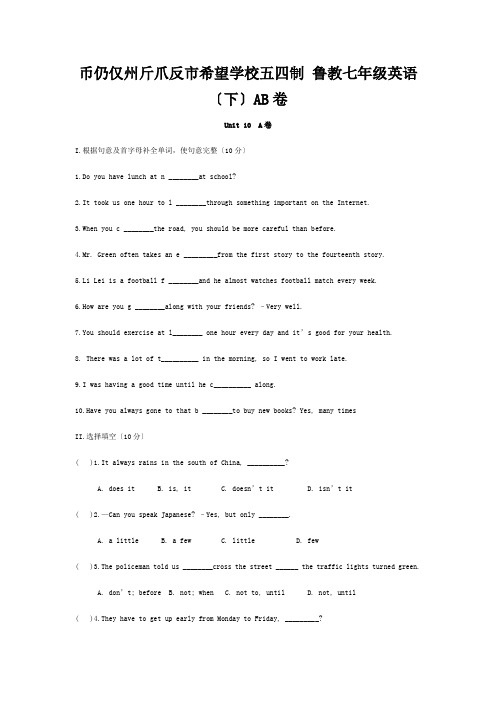
币仍仅州斤爪反市希望学校五四制鲁教七年级英语〔下〕AB卷Unit 10 A卷I.根据句意及首字母补全单词,使句意完整〔10分〕1.Do you have lunch at n ________at school?2.It took us one hour to l ________through something important on the Internet.3.When you c ________the road, you should be more careful than before.4.Mr. Green often takes an e _________from the first story to the fourteenth story.5.Li Lei is a football f ________and he almost watches football match every week.6.How are you g ________along with your friends? –Very well.7.You should exercise at l________ one hour every day and it’s good for your health.8. There was a lot of t__________ in the morning, so I went to work late.9.I was having a good time until he c__________ along.10.Have you always gone to that b ________to buy new books? Yes, many timesII.选择填空〔10分〕( )1.It always rains in the south of China, __________?A. does itB. is, itC. doesn’t itD. isn’t it( )2.—Can you speak Japanese? –Yes, but only ________.A. a littleB. a fewC. littleD. few( )3.The policeman told us ________cross the street ______ the traffic lights turned green.A. don’t; beforeB. not; whenC. not to, untilD. not, until( )4.They have to get up early from Monday to Friday, _________?A. do theyB. don’t theyC. have theyD. haven’t they( )5.We’d better get to school on time, _________?A. wouldn’t weB. shouldn’t weC. didn’t weD. hadn’t we( )6.-What are you going to do this weekend? –I _______yet.A. haven’t decidedB. won’t decideC. have decidedD. didn’t decide( )7.He often _____us a story in the evening. We all love his interesting stories.A. speaksB. talksC. tellsD. says( )8.Li Lei is more outgoing than others so he makes it a lot__________ in a new class.A. easy to get onB. easier to get alongC. difficult to get onD. more difficult to get along( )9.The people kept having a meeting until the director _________.A. came onB. came outC. came alongD. came in( )10.Tom didn’t come to school this morning, but I _____he can come this afternoon.A. sureB. be sureC. make sureD. surelyIII.根据所给词的适当形式填空〔15分〕1.Have you heard there__________(be) a concert this afternoon.2.This jacket is much ______________(expensive) than that one.3.He ___________(not do) well in ________(play) basketball.4.They___________(look) through the test papers already and didn’t make any mistakes.5.After_________(cross) the street, he found an airport in front of them.6.Thanks for _________(look) after my sister while I was _______(go) away from home to shop.7.He really had a hard time ___________(finish) this difficult job.8.It was really boring, ________________(be not) is ? –Yes, it is a little_________(bored).9.There’s usually a lot of _________(traffic) at this time of day.i hates _____(drive) on the road.10.He asked the policeman for help, _________(do) he? No, he didn’t He found his car by ____________(him)IV.根据汉语意思完成以下句子〔15分〕1.刚刚我在网上浏览了一下关于野营的信息。
- 1、下载文档前请自行甄别文档内容的完整性,平台不提供额外的编辑、内容补充、找答案等附加服务。
- 2、"仅部分预览"的文档,不可在线预览部分如存在完整性等问题,可反馈申请退款(可完整预览的文档不适用该条件!)。
- 3、如文档侵犯您的权益,请联系客服反馈,我们会尽快为您处理(人工客服工作时间:9:00-18:30)。
Unit 10 It’s a nice day, isn’t it?一 . [话题](Topic)Small talk二 .[重点词组](Key Phrases)1. look like 看起来像…2. by noon 到中午为止3. on the weekend 在周末4. look through 浏览5. wait in line 排队等候6. a ball game fan 球迷7. have a wonderful time 过得愉快8. on Saturday night 在周六晚上9. thank you so much for … 为…而非常感谢你10. be friendly to 对…友好11. feel like 感觉像…12. part of …的一部分13. have a hard time doing… 做…时很费劲14. come along 出现,发生15. enjoy doing 享受做…的乐趣16. be good at … 擅长于…17. help sb. with sth. 帮助某人做某事help sb. (to) do sth.18. a lot easier 容易的多19. get along 相处20. be careful to do sth. 小心去做某事21. at least 至少22. at this time 此时三 .[交际用语]1. It's a nice day, isn't it?今天是个好天气,不是吗?Yes, it is. 是。
2. You're Ben's sister, aren't you?你是的姐姐/妹妹,对吗?Yes, I am.是的,我是。
3. You love violin music, don’t you?你喜欢小提琴乐曲,对吗?Yes, I do. 是的,我喜欢。
四. [重点难点释义](Language Points)1. I hope so. 我希望如此。
此处so 是副词,用作替代词。
意为“如此”“如是”。
如-Our team will win. 我们队会赢的。
-I hope so. 我希望如此。
2. by 不迟于;在什么……之前Do you think it'll stop by noon? 你认为中午之前雨会停吗?By then he was more than fifty years of age. 到那时他已经五十多岁了。
3. I hope the bus comes soon. 我希望汽车快点儿来。
在hope的宾语从句中,既可以用一般将来时表示将来时间,也可以用一般现在时表示将来时间,如本句。
再如:I hope she likes / will like the flowers. 我希望她回喜欢花。
We all hope you get / will get well soon. 我们都希望你能不久痊愈。
4. look through 浏览;翻阅;看一遍Look through this plan for me, and tell me what you think of it.替我看一遍这项计划,并把你的想法告诉我。
There're some important papers I have to look through tonight.有些重要的文件需要我今晚看。
5. Sometimes it isn't easy being the new kid at school.有时在学校里做个新生可真不容易。
it代表动名词表示的主语,如本句。
再如:It’s a waste of time talking to him. 和他谈话是白费时间。
It isn't fun staying at home by yourself. 一个人待在家里没意思。
6. come along 可以表示意外地“出现”“来到”或“发生”,如:Take any opportunity that comes along. 抓住每一个出现的机会。
A bus should come along any time now. 现在公共汽车随时都可能会来。
7. be friendly to sb. 对某人友好或对某人友善;Be friendly with sb. 和某人关系好或同某人要好。
试比较:He's not very friendly to newcomers. 他对新来的人不太友善。
The classmates in our class are friendly with each other.我们班上的同学相互关系都很好。
8. He sure is(他)的确是(这样)。
(1)这里sure是副词,意为“确实地”,是美国的俗语说法。
如:It sure was very cold.天确实很冷。
He sure is a good man.他的确是个好人。
(2)sure主要作形容词用。
如:I think she's coming, but I'm not quite sure.我想她会来的,但不太肯定。
Are you sure of your facts? 你确信你说的都是真的吗?9. To have successful small talk, both people need to ask questions.要想使聊天顺利进行,两个人都需要提出问题。
(1)both在这里作形容词用,意为“两个…都…”,如:I saw him on both occasions. 在那两个场合我都见过他。
You can't have it both ways. 你不能鱼和熊掌兼得。
both经常用作代词。
如:Both of us want to go to the park.我们两个够想去公园。
"What would you like, coke or juice ""both"“你是要可乐和果汁”“两个都要”both作主语时只能用肯定形式。
表示“两个都不……”时,要用反义词。
如:Both of them are from Canada.他们两个都是加拿大人。
Neither of them is from Canada.他们两个都不是加拿大人。
(2)need在这里作实意动词用,意为“需要……”,后面常跟名词或不定式。
如:Do you need any help? 你需要什么帮助?Which bus do I need to take? 我要乘几路车?need 也可做情态动词,但一般只用在否定句中。
如:You needn’t wash these dishes. 这些盘子你不用洗。
Need I explain once more? 需要我再解释一次吗?10. alone意为“单独、独自”相当于(all)by himself。
如:We’re alone on this island. (We're all by ourselves on t his island.)这个岛上就我们这些人。
She always goes home alone. (She always goes home by himself).她总是一个人回家。
11. 辨析:alone/lonelylonely为形容词,意为“孤独的,荒凉的”可用作定语和表语,而alone既可以用作形容词也可以作副词用,表示客观上无人陪伴。
但形容词用时只可用作表语。
如:He lives in a lonely place alone.他独自住在荒郊野外。
He was alone, but he didn't feel lonely. 他虽独自一人,但并不感到寂寞。
12. wait to do sth. 等候做某事,can't wait to do sth. 等不及做某事。
如:The reporters are waiting at the airport to welcome the hero back.记者门在机场等候欢迎英雄凯旋。
The children can't wait to open the presents in the stockings.孩子门迫不及待的要打开袜子里的礼物。
13. 辨析 cross, crossing和across(1)cross n. 十字形,十字记号 vt. 穿过,越过,横过(2)crossing n. 十字路口,交叉点(3)across prep. 穿过;横穿例:Be careful when you cross the road.过马路时要小心。
Turn right at the second crossing.在第二个十字路口往右拐。
Go across the bridge, you’ll find the ho spital.越过这座桥,你就会看到这家医院。
14. cost 意为“值”“花费”,通常以物作主语,即:某物花(某人)多少钱。
如:That house cost him 3000 000. 那所房子花了他30万。
It costs them 10 000 a year to run a car. 使用一部小汽车每年花他们一万。
15. I feel like part of the group now. 我感觉像这个群体的一部分了。
feel like.“感觉像…” 后面跟名词或动名词。
如:I feel like flying. 我感觉像在飞。
She feels like dreaming. 她感觉像在做梦。
但是如果后面跟动名词的话,一般是表示“想要”的意思,等于want。
如:He doesn't feel well and he doesn't feel like eating anything. (He doesn't feel well and he doesn't want to eat anything) 他不舒服,不想吃东西。
Do you feel like going for a walk? (Do you want to go for a walk) 你想出去散步吗?五.语法知识1. 反意疑问句是用以要求对方证实所陈述之事,它由两部分组成,前面是陈述句,后面是简短问句。
如果前面是肯定句,后面一般是否定问句,如果前面是否定句,则后面多是肯定句。
2. 反意疑问句使用中应注意以下几个方面:✧除There be句型外,疑问部分的主语必须是与陈述部分的主语在人称数性方面保持一致的人称代词。
